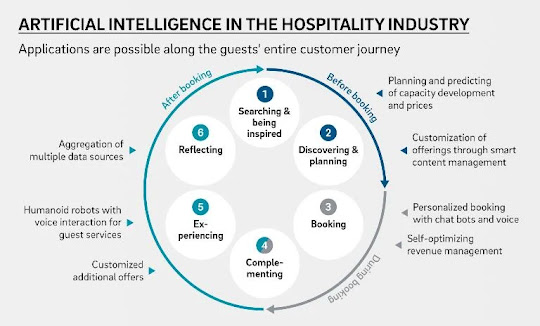In today's fast-paced world, the hospitality industry has been quick to adopt emerging technologies to enhance guest experiences and streamline operations. One such differentiator is artificial intelligence (Ai), which has already begun to leave its mark on the industry. Today, we will explore how Ai is currently transforming the hospitality sector and discuss the exciting possibilities that lie ahead for hotel managers.
With ‘Personalized
Guest Experiences’, Ai empowers hoteliers to deliver highly personalized
experiences to their guests. Machine learning algorithms analyze vast amounts
of guest data, including preferences, booking history, and their feedback, to
provide tailored recommendations and anticipate their needs well in advance.
From personalized room settings to specific suggestions for dining and
activities based on guest preferences, Ai enables hotels to create memorable
experiences that leave a lasting impression on guests.
Guest
experiences need the backup of ‘Efficient Operations’ and Ai-driven systems are
already revolutionizing hotel operations, making them more efficient and
cost-effective. (That’s greater revenue income my friends). Intelligent
chatbots and virtual assistants are handling guest inquiries, managing
bookings, and providing concierge services, allowing the staff to focus on more
complex guest requests. And all the while, Ai-powered revenue management
systems are operating constantly in the back-office; analyzing market trends,
competitor pricing, and historical data to optimize pricing and maximize
revenue.
Guest
Experience is always the best with an ‘Enhanced Safety and Security’ protocols
in place. In an increasingly security-conscious world, Ai plays a vital role in
ensuring the safety and security of guests and staff. Facial recognition technology
enables seamless check-ins and access control, reducing wait times and
enhancing the comfort levels of guests and staff. Ai-powered surveillance
systems can detect unusual behavior patterns, identify potential threats, and
proactively alert security personnel, preventing incidents before they occur.
Of
course, for the front-line service to be optimal, there is a requirement of ‘Streamlined
Backend Operations’, where Ai is automating routine tasks and processes.
Inventory management systems equipped with Ai algorithms can be used to predict
demand patterns, optimize stock levels, and automate replenishment, minimizing
waste and reducing costs. Ai-powered housekeeping management systems can
efficiently schedule and assign tasks, improving productivity and ensuring
timely service.
Add to
this the ‘Hyper-Personalized Marketing’ aspect, where Ai empowers hotel
marketers to deliver highly-personalized marketing messages, tailored for each
individual guest. By analyzing guest preferences, behavior, and demographic
data, Ai algorithms can segment the audience(s) and create targeted marketing
content that resonates with each individual. From personalized email campaigns
to tailored offers and recommendations, Ai helps hotels drive customer
engagement, increase conversions, and foster loyalty.
So, what is
the future of Ai in the hospitality sector, you might ask? Where is this
technology leading upto?
Let’s
start with the ‘Voice-Activated Smart Rooms’, where the guests are walking into
their hotel rooms and instructing the voice activated Ai assistant to adjust
the room temperature, the lighting, or order room service. Voice-activated
smart rooms powered by Ai are the future of hospitality, offering guests a
seamless and intuitive experience.
The hotel
operations will benefit hugely due to ‘Predictive Maintenance’, where Ai-powered
sensors and machine learning algorithms will be analyzing data from various
equipment and systems within the hotel, enabling predictive maintenance. By
detecting potential issues before they escalate, hotels can avoid costly
downtime and deliver a seamless guest experience.
Of
course, there are the ‘AI-Enabled Robots’, that are already making their
presence felt in the hospitality industry, and Ai will further enhance their
capabilities. From robotic concierges to room service delivery robots, Ai-powered
robotics will streamline operations, reduce costs, and offer guests a unique
and futuristic experience.
As Ai
continues to evolve, its impact on the hospitality industry will only grow
stronger. Hotel managers who embrace this technology and leverage its
capabilities stand to gain a competitive edge in delivering exceptional guest
experiences while optimizing operations. By harnessing the power of Ai, hotels
can adapt to changing guest expectations, enhance efficiency, and unlock a
future of limitless possibilities.
Remember,
Ai is not here to replace the human touch nor will they replace human
employees. It is here to augment and enhance employee performance and hotel
efficiency, allowing hoteliers to create truly memorable experiences for their
guests in this ever-evolving digital age.
For more
detailed discussion, do get in touch with #TeamARIS via email or WhatsApp.
Pic curtsey: Roland Berger



